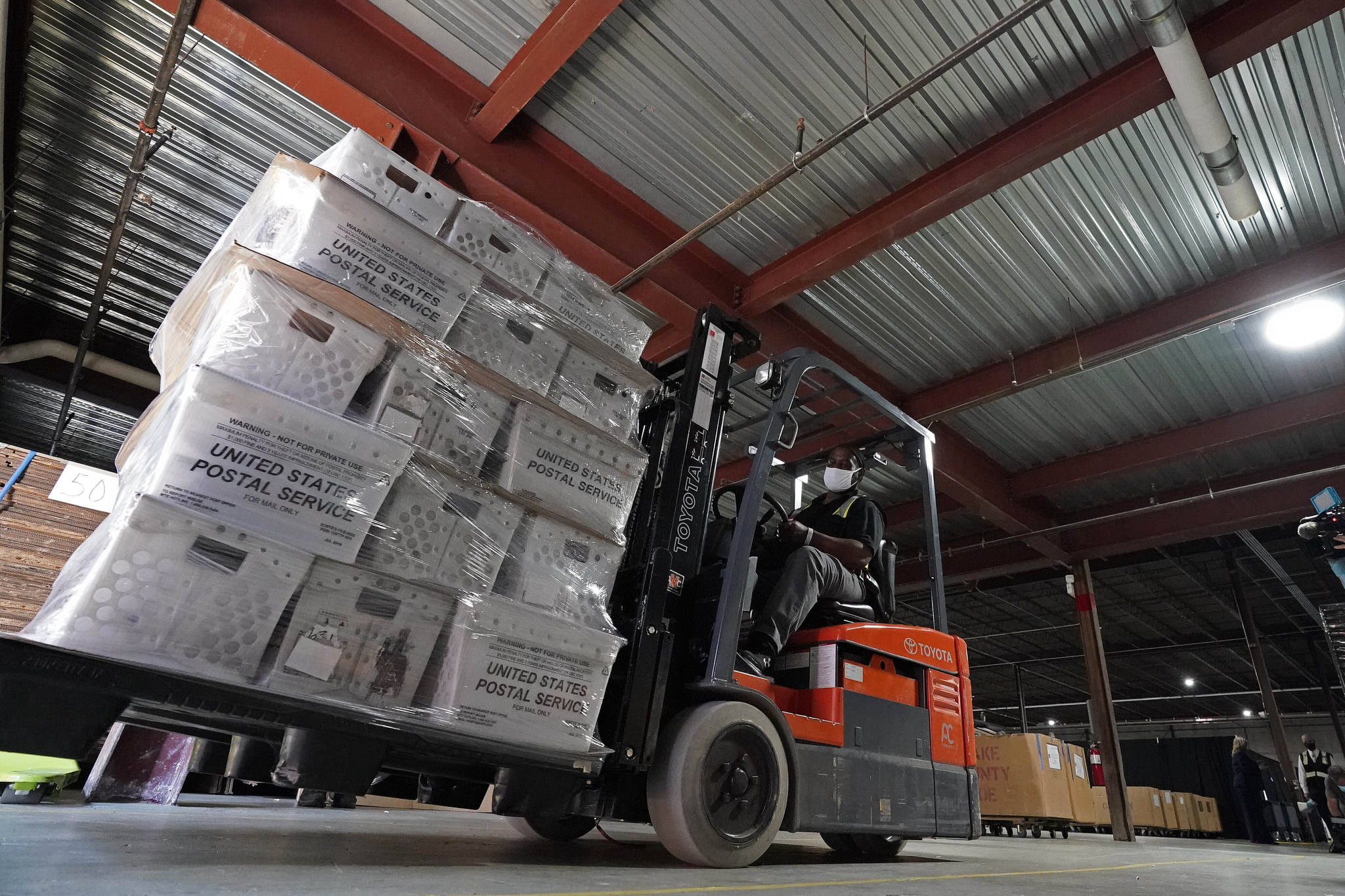U.S. Postal Service records show delivery delays have persisted across the country as millions of Americans are voting by mail, raising the possibility of ballots being rejected because they arrive too late.
Postal data through Oct. 9, released through a federal court order, show nearly all the agency’s delivery regions missing its target of having at least 95% of first-class mail arrive within five days. Parts of the presidential battleground states of Minnesota, Wisconsin, Michigan, Pennsylvania and Ohio fell short of delivery goals by wide margins as the agency struggles to regain its footing after a tumultuous summer.
The districts that include the major urban areas and their suburbs in each of those states all performed below the national average for on-time delivery, with the area around Pittsburgh in western Pennsylvania the lone exception.
The delays are a worrisome sign for voters who still have not returned their absentee ballots. That is especially true in states such as Michigan, where ballots must be received by Election Day. Other states require a postmark by Nov. 3.
“We do encourage people who are worried about ballots not getting here on time to get them in as soon as possible,” said Perry County Commissioner Brenda Watson in Pennsylvania.
She said her office has sent out more than 600,000 absentee ballots, more than double the number from the primary, and has extended office hours so staff can monitor a drop box.
With more than 2.9 million mail-in ballots requested in Pennsylvania, on-time delivery is crucial. But delays are lingering throughout the state, according to the agency’s most recently available data released as part of the federal court order.
In the week that ended Oct. 9, first-class mail was delivered on time 79.7% of the time in the district covering Philadelphia and its suburbs, and 83.2% of the time in central Pennsylvania, both below the national average of 86.1%.
A deadlock at the U.S. Supreme Court this week allowed the state to count mailed-in ballots received up to three days after the Nov. 3 election, although Republicans have filed another challenge.
Delays have plagued the Postal Service during the coronavirus pandemic and worsened under a series of cost-cutting policies implemented by Postmaster General Louis DeJoy, who took over the agency in June. Following a series of court orders and intense public scrutiny, the agency has reversed the policies and seen improvements, but has not yet fully restored delivery times.
“As these delays continue across the country just weeks before the upcoming presidential election, it is incumbent upon you to take immediate and necessary actions to fully restore on-time mail delivery,” U.S. Sen. Gary Peters, a Michigan Democrat, wrote to DeJoy this week.
In a statement, Postal Service spokesman David Partenheimer said offices have been authorized to use expanded processing procedures, additional delivery and collection trips, and overtime hours to ensure election mail arrives on time. The agency also announced it will treat election mail as first-class, which had previously been an informal policy.
“The Postal Service is fully committed and actively working to handle the increase in election mail volume across the country over the next two weeks,” Partenheimer said.
Mail-in ballots arriving past the deadline is a main reason many of them get rejected. That has led election officials nationwide to urge voters to return ballots as soon as possible or take advantage of ballot drop boxes or early in-person voting.
The postal district that covers the eastern third of Michigan, including Detroit and its suburbs, has consistently been one of the worst performing regions. It had the nation’s slowest deliveries in the opening days of October, with just 70.9% of mail arriving on time.
Michigan has sent every registered voter a ballot application, but mail-in votes must arrive by Election Day to count, following a court order that blocked a 14-day extension backed by Democrats. Secretary of State Jocelyn Benson has told voters who have not yet mailed in their ballots to skip the Postal Service altogether and put ballots in a drop box or take them to their local clerk’s office.
Other battleground areas also showed problems in early October, with delivery rates of first-class mail below the national average. That includes all of Ohio and districts that encompass major urban areas in Wisconsin, Georgia and North Carolina.
Postal delays also could compound existing issues that have cropped up in recent weeks as election officials manage the unpreceded surge in mail voting with deadlines looming.
In Ohio earlier this month, a machine error led to 50,000 incorrect absentee ballots being sent. Then hundreds of thousands of absentee ballots were delayed when the company printing them became overwhelmed by the volume of ballots requested.
While Ohio allows ballots to be counted if they arrive up to 10 days after the election, they must be postmarked no later than the day before Election Day.

